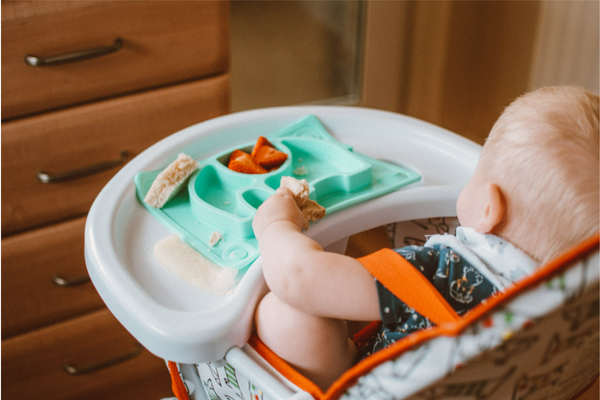Weaning is an important and exciting part of your child’s life. It shows they are growing up and becoming more independent, which can be an emotional time for mum but it really is something to look forward to and be proud of.
If you’re reading this, it means you’re probably planning on weaning soon or are wondering when the best time to start weaning is. Well, look no further, as we’ve designed a list of our top 8 tips to help with weaning, according to advice given by the HSE. As this stage is so important in your baby’s development, we’ve made these tips as concise and easy to follow as possible so busy mums can read this and be sure they’re getting really useful tips.
Notice the signs that they’re ready for weaning
There are many signs that your baby may be showing that they’re ready to move onto solid foods. This usually happens at 4 to 6 months. If your baby can support and control their own head movements, shows an interest in food when others are eating, has the coordination to pick up food and put it in their mouth or tries to swallow food instead of instantly spitting it out, these are normally signs that they are ready to be introduced to weaning. Note that you should not start weaning if your baby is under 4 months old as their kidneys and digestive system are not yet developed for solid foods.
Being safe
Never force your child to eat any food. If you rush them into eating you can scare them from wanting to try new foods and it is a choking hazard. When you are weaning your child, never leave them alone when they are eating as this is also a choking hazard.
Hygiene
Always wash your hands thoroughly before preparing food for your weaning baby. Also, make sure to properly clean any plates, bowls and cutlery you use to feed your baby properly after each use. Since your baby will be exploring new textures and flavours, they’re bound to spit food out or get excited and throw their food around, so be prepared for mess with bibs and floor mats.
Food preparation
Making your own baby food from scratch is cheaper than buying pre-prepared jars and pouches, but it’s important to know what to put in your baby’s food. At the start of their weaning journey, make sure to liquidise and mash food really well so there are no lumps in it. When you make homemade baby food, you have complete control over what ingredients are going into a dish, so you don’t need to worry about unnecessary additives. The key ingredient to remember not to add to your baby’s food when you are making it is salt. Eating foods with salt in is not good for your child’s kidneys and should be avoided. When it comes to adding flavourful ingredients into your child’s food so it is not bland for them, opt for products with no added salt.
Routine
Keep your baby in the routine of trying one new food a day. If you put a plate of lots of new foods in front of them, this can overwhelm them and make them scared to try so many new flavours and textures. Start off with one teaspoon of food per meal and gradually build the amount up over time. Once they are eating about 6 teaspoons of food as a meal, you can introduce a second meal to allow them to explore foods together.
No distractions
It’s best to introduce weaning when you have plenty of time to set aside to feed your little one and watch them as they try new foods. Starting off, your baby will probably want to take their time because everything is new to them and can seem daunting. Make sure they aren’t super tired as they may get fussy and won’t want to try anything new. Try not to have the television on as this can be distracting for your child and they may not want to eat if their favourite show is on.
Using a spoon
As your child starts to wean, they will eventually be feeding themselves as they get older. It’s good to introduce a spoon to them when they start weaning so they get used to holding one and learn to move food with it. If they make a mess and food ends up all over them because they like playing with the spoon, don’t worry! Making a mess is part of learning to eat solids, it’s their first time trying to use a spoon after all.
Have fun
Don’t put too much stress on yourself or your little one as they start their weaning journey. All children are different and will pick up on eating solids in their own time. Let them get messy and excited as they start this huge step in their development.
Brought to you by
With Knorr Zero salt, you decide if, and how much salt to add to your meals without compromising on flavour. Available from retailers nationwide in free range Chicken, Vegetable and Beef sourced from responsible farms, they’re packed with a delicious blend of sustainably farmed vegetables, herbs and spices











